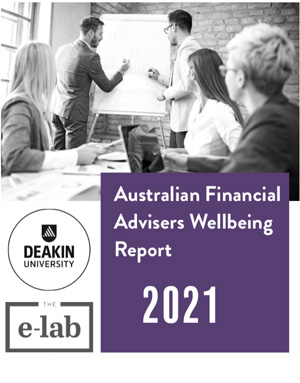Drawing on industry support services and working with a good mentor are among the recommendations of a new report looking at what financial advisers can do to improve their mental health.
The report, produced by Deakin University and research firm The E-lab in Australia, says the financial services industry there has experienced turmoil in recent years, something plenty of advisers in New Zealand have also faced due to Covid and regulatory change.
Based on interviews with 43 financial advisers, the report says 73% of advisers are experiencing high levels of burnout from work, and that 33% are seeking medical care to manage health symptoms caused by workplace stress.
More than 60% suffer from poor sleep due to stress, and 67% of advisers experience depression. Of particular concern is that 17% of advisers are depressed most of the time or all of the time.

The 76-page report includes a list of recommendations for those feeling the strain:
- Invest in your psychological flexibility, adaptive performance and psychological capital. The report says advisers who have these skills enjoy better wellbeing, mental health and business performance
- Seek help and engage in industry support services
- Be an active member of an industry association. Interviewees who were active in an association seemed to get a lot more out of these bodies than those who were passive members
- Mentoring and coaching can make a big difference in taking constructive action to improve your situation
- Engage in regular recovery activities, including physical exercise, relaxation, mindfulness, debriefing, passions and hobbies outside of work
- Seek professional development / self-development
- Where possible, employ staff to undertake administration activities. It may only save you a few hours a week, but it can make a difference
- Be clear about what’s work and what’s not. Advisers who understand this role separation are more likely to be attentive to family needs and won’t be distracted by work during that time
Closer to home, Financial Advice NZ has an ongoing peer support programme that was started to help members cope with the impact of Covid-19.
“This is supported by about 30 senior advisers who have volunteered their time, we get a few requests for support every month,” says Katrina Shanks, CEO of the organization.
The report’s authors also have recommendations for the financial services industry:
- Provide higher support for advisers in completing the exam and tertiary studies
- Provide an industry-wide mentoring program
- Provide access to targeted wellbeing support
- Provide industry counsellors
- Provide access to training in psychological flexibility, psychological capital and adaptive performance
- Provide access to systems to enable efficiency of administration and compliance work
Richard Klipin, CEO of the FSC, says his organization has routinely raised the issue of mental health in many of its research papers.
“There is no doubt that in times of change, and Covid is a classic example, the whole New Zealand community had to find an inner strength and resilience to manage their way through this,” he says.
“For advisers there has been the pandemic to manage, their clients to manage, and the transitional change through licensing and so on.”
Klipin says the FSC has partnered with Voices for Hope, a non-profit organization aimed at breaking the stigma around mental illness, and says the insurance industry has come to the party with many firms providing support to the adviser community.





